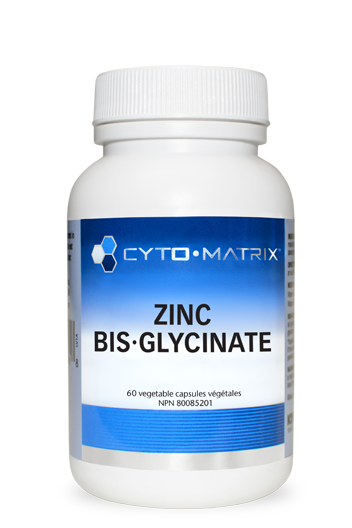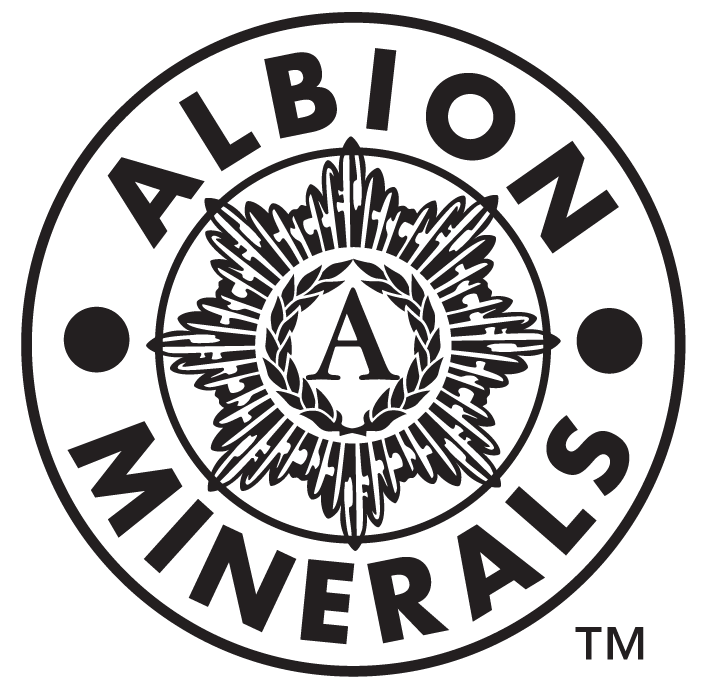Zinc Bis-Glycinate – 25mg Full Chelate 60 v-caps
- Each vegetable capsule provides 25mg of elemental zinc in a bis-glycinate chelate form for optimal absorption and tolerability
- Indicated for boosting immunity, balancing mood, improving skin health, balancing various hormones and vision support
- Should also be considered in seniors, those with digestive health disorders, vegetarians, pregnant women and those who are on multiple prescription medications
Individuals with suboptimal zinc levels classically present with symptoms of poor immunity, impaired wound healing, skin conditions and poor taste. However, these are just the most well-known signs of zinc deficiency. Zinc’s role in overall health is much more complex.
Zinc’s reputation as an immune boosting mineral is well-deserved as it is required for the normal development and function of natural killer cells, neutrophils, macrophages and various cytokines. Research has shown that it is actually capable of preventing viral replication in the upper respiratory tract, making it acutely indicated during the common cold and other infections.
When it comes to hormonal balance, zinc helps to stabilize insulin and thereby regulate blood sugar levels. It is also involved in thyroid health by increasing receptor sensitivity to triiodothyronine (T3). Finally, in males, a zinc deficiency can negatively affect sperm parameters. Zinc deficiency has been shown to contribute to low testosterone levels.
Other clinical indications for zinc supplementation include eating disorders (anorexia nervosa and bulimia nervosa), age-related macular degeneration, diabetic peripheral neuropathy, gastric ulcers, oligospermia and depression. Supplemental zinc has been well-researched and proven to be beneficial in all of these conditions.
Ensuring that the body has optimal zinc levels is not only imperative in populations with the aforementioned clinical conditions, but also in special populations that, while not symptomatic, may have greater zinc requirements. Populations with greater zinc requirements include seniors, patients with digestive health disorders, vegetarians, pregnant women and patients on multiple prescription medications.
Cyto-Matrix’s Zinc Bis·Glycinate provides 25mg of elemental zinc in a fully chelated bis-glycinate form for optimal absorption and tolerability, with minimal risk of nausea in even the most sensitive patients.
| Ingredient | Amount | |
|---|---|---|
| Zinc (TRAACS™ Zinc Bis-glycinate Chelate) | 25mg | |
|
Non-Medicinal Ingredients: Vegetable-grade magnesium stearate, microcrystalline cellulose. Capsule: hypromellose.
Directions for Use: Adults - Take 1 capsule per day with food, or as directed by a healthcare professional. Take a few hours before or after taking other medications.
Cautions: Do not use if safety seal is broken.
Individuals with suboptimal zinc levels classically present with symptoms of poor immunity, impaired wound healing, skin conditions and poor taste. However, these are just the most well-known signs of zinc deficiency. Zinc’s role in overall health is much more complex.
Zinc’s reputation as an immune boosting mineral is well-deserved as it is required for the normal development and function of natural killer cells, neutrophils, macrophages and various cytokines. Research has shown that it is actually capable of preventing viral replication in the upper respiratory tract, making it acutely indicated during the common cold and other infections.
When it comes to hormonal balance, zinc helps to stabilize insulin and thereby regulate blood sugar levels. It is also involved in thyroid health by increasing receptor sensitivity to triiodothyronine (T3). Finally, in males, a zinc deficiency can negatively affect sperm parameters. Zinc deficiency has been shown to contribute to low testosterone levels.
Other clinical indications for zinc supplementation include eating disorders (anorexia nervosa and bulimia nervosa), age-related macular degeneration, diabetic peripheral neuropathy, gastric ulcers, oligospermia and depression. Supplemental zinc has been well-researched and proven to be beneficial in all of these conditions.
Ensuring that the body has optimal zinc levels is not only imperative in populations with the aforementioned clinical conditions, but also in special populations that, while not symptomatic, may have greater zinc requirements. Populations with greater zinc requirements include seniors, patients with digestive health disorders, vegetarians, pregnant women and patients on multiple prescription medications.
Cyto-Matrix’s Zinc Bis·Glycinate provides 25mg of elemental zinc in a fully chelated bis-glycinate form for optimal absorption and tolerability, with minimal risk of nausea in even the most sensitive patients.
| Ingredient | Amount | |
|---|---|---|
| Zinc (TRAACS™ Zinc Bis-glycinate Chelate) | 25mg | |
|
Non-Medicinal Ingredients: Vegetable-grade magnesium stearate, microcrystalline cellulose. Capsule: hypromellose.
Directions for Use: Adults - Take 1 capsule per day with food, or as directed by a healthcare professional. Take a few hours before or after taking other medications.
Cautions: Do not use if safety seal is broken.



